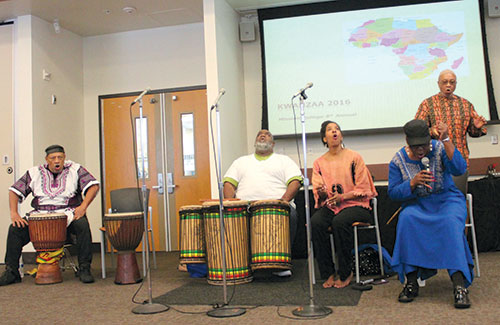

At noon on Dec. 7, students from Mission College’s Humanities 18 class marched into the dining room at the Hospitality Management Building to kick off the school’s Kwanzaa celebration. Kwanzaa has its roots in an agricultural celebration from Africa called “the first fruits” celebration. First the students constructed an altar. Items they set on a display table, translated from Swahili to English, included mkeka (a mat), kinara (a candle holder), mazao (crops), muhindi (corn) and zawadi (books and gifts). Then the students passionately recited monologues in a dramatic poetry reading for the public.
“[Regarding the event name Kwanzaa yenu iwe na heri], that’s a Swahili greeting and there’s no English translation to it; the intent is to simply say ‘welcome and we greet you with the grace of the ancestors and the spirit of the gods,'” says Dr. David Piper, adjunct faculty in the Liberal Studies, Liberal Arts and Counseling departments at the school. “Kwanzaa runs from Dec. 26 to Jan. 1 and so school is closed during that time. Therefore we do an acknowledgement of Kwanzaa so students can experience an African and African-American event. Under the rubric of dramatic poetry reading, we are celebrating pre-Kwanzaa.”
Piper shares the seven principles of Kwanzaa, translated from Swahili to English: umoja (unity), kujichagulia (self-determination), ujima (collective work and responsibility), ujamaa (cooperative economics), nia (purpose), kuumba (creativity) and imani (faith).
“Those seven principles play a specific role in the creation of our daily lives,” Piper says. “You can compare these principles to New Year resolutions, where people promise themselves that they will try to be better than how they have been before. The philosophy of Kwanzaa is Kawaida -this is a philosophy of culture and social change. The seven principles and Kawaida would be themes in the poetry.”
According to Piper, most of the students’ monologues came from classroom materials, some of which were modified for the reading.
“Ninety-five percent of materials used in the ceremony was gleaned from the text and supporting materials used in the Humanities 18 class for instructional purposes,” he says. “Students used their ability to compare and contrast textbook materials with our current social challenges.”
“Kwanzaa is when people talk about the past and when children learn old stuff that their parents know about when they talk about people who lived long ago and did great things,” Isaiah Venegas reads aloud. “Kwanzaa can teach you about your culture and how to like it and how to respect people in nature.”
“This is how you enslave a person forever: You take away their language, music, you take away their ancestral ties and their drum,” Cheyenne Mosley recites. “You substitute them with the colonizers’ and the enslavers’ [and] the mainstreamers’ language, music, religion and ancestral ties…”
Mosley went on to lead the group into a song with the lyrics: “We who believe in freedom cannot rest/ We who believe in freedom cannot rest until it comes.”
Also part of the event were song and dance performances from members of the Akoma Arts Group. A lunch buffet for the students and attendees came with flavors of soul cuisine, such as macaroni and cheese, baked beans, cole slaw, honey buttered cornbread and fried chicken.


